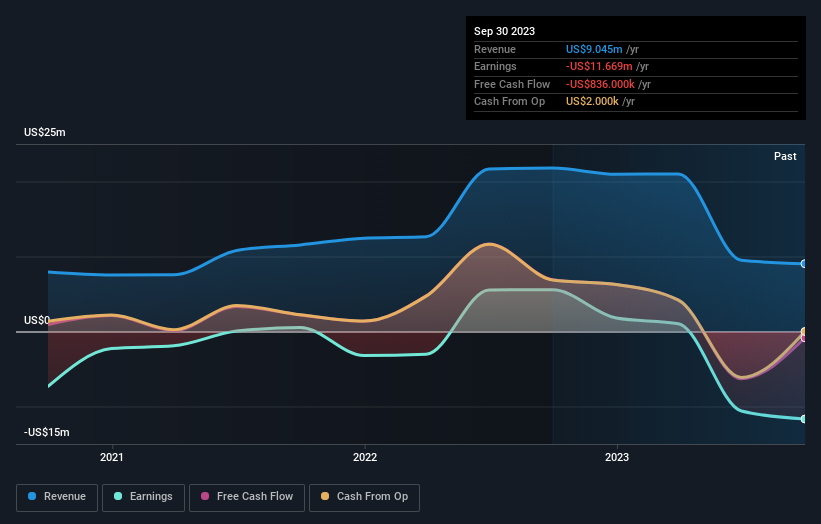Insiders the biggest winners as Maui Land & Pineapple Company, Inc.'s (NYSE:MLP) market cap rises to US$372m
Key Insights
Insiders appear to have a vested interest in Maui Land & Pineapple Company's growth, as seen by their sizeable ownership
61% of the company is held by a single shareholder (Stephen Case)
Institutional ownership in Maui Land & Pineapple Company is 24%
If you want to know who really controls Maui Land & Pineapple Company, Inc. (NYSE:MLP), then you'll have to look at the makeup of its share registry. And the group that holds the biggest piece of the pie are individual insiders with 65% ownership. That is, the group stands to benefit the most if the stock rises (or lose the most if there is a downturn).
Clearly, insiders benefitted the most after the company's market cap rose by US$60m last week.
Let's delve deeper into each type of owner of Maui Land & Pineapple Company, beginning with the chart below.
See our latest analysis for Maui Land & Pineapple Company
What Does The Institutional Ownership Tell Us About Maui Land & Pineapple Company?
Institutions typically measure themselves against a benchmark when reporting to their own investors, so they often become more enthusiastic about a stock once it's included in a major index. We would expect most companies to have some institutions on the register, especially if they are growing.
As you can see, institutional investors have a fair amount of stake in Maui Land & Pineapple Company. This suggests some credibility amongst professional investors. But we can't rely on that fact alone since institutions make bad investments sometimes, just like everyone does. If multiple institutions change their view on a stock at the same time, you could see the share price drop fast. It's therefore worth looking at Maui Land & Pineapple Company's earnings history below. Of course, the future is what really matters.
Maui Land & Pineapple Company is not owned by hedge funds. The company's largest shareholder is Stephen Case, with ownership of 61%. This essentially means that they have extensive influence, if not outright control, over the future of the corporation. For context, the second largest shareholder holds about 6.3% of the shares outstanding, followed by an ownership of 3.3% by the third-largest shareholder.
While it makes sense to study institutional ownership data for a company, it also makes sense to study analyst sentiments to know which way the wind is blowing. We're not picking up on any analyst coverage of the stock at the moment, so the company is unlikely to be widely held.
Insider Ownership Of Maui Land & Pineapple Company
The definition of company insiders can be subjective and does vary between jurisdictions. Our data reflects individual insiders, capturing board members at the very least. The company management answer to the board and the latter should represent the interests of shareholders. Notably, sometimes top-level managers are on the board themselves.
I generally consider insider ownership to be a good thing. However, on some occasions it makes it more difficult for other shareholders to hold the board accountable for decisions.
Our information suggests that insiders own more than half of Maui Land & Pineapple Company, Inc.. This gives them effective control of the company. Given it has a market cap of US$372m, that means they have US$242m worth of shares. It is good to see this level of investment. You can check here to see if those insiders have been buying recently.
General Public Ownership
The general public, who are usually individual investors, hold a 11% stake in Maui Land & Pineapple Company. While this group can't necessarily call the shots, it can certainly have a real influence on how the company is run.
Next Steps:
I find it very interesting to look at who exactly owns a company. But to truly gain insight, we need to consider other information, too. Case in point: We've spotted 1 warning sign for Maui Land & Pineapple Company you should be aware of.
If you would prefer check out another company -- one with potentially superior financials -- then do not miss this free list of interesting companies, backed by strong financial data.
NB: Figures in this article are calculated using data from the last twelve months, which refer to the 12-month period ending on the last date of the month the financial statement is dated. This may not be consistent with full year annual report figures.
Have feedback on this article? Concerned about the content? Get in touch with us directly. Alternatively, email editorial-team (at) simplywallst.com.
This article by Simply Wall St is general in nature. We provide commentary based on historical data and analyst forecasts only using an unbiased methodology and our articles are not intended to be financial advice. It does not constitute a recommendation to buy or sell any stock, and does not take account of your objectives, or your financial situation. We aim to bring you long-term focused analysis driven by fundamental data. Note that our analysis may not factor in the latest price-sensitive company announcements or qualitative material. Simply Wall St has no position in any stocks mentioned.


